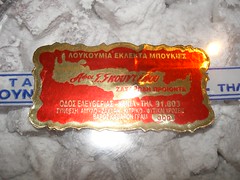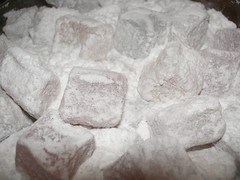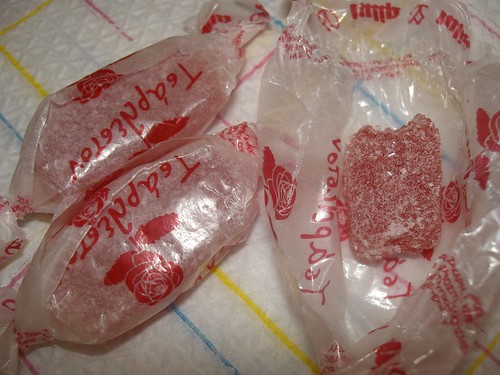Dear Maria,
While searching for an obscure Greek cooking term, I came across your blog and marvelled at how much you know about Greek cuisine, so I thought to take the liberty and ask if you can tell me anything about how roses are used in Greek cuisine.
Your loyal reader
Rising early to enjoy the morning breeze, before the sun stifles the air and bakes the earth, I sat outdoors on the balcony admiring my mother-in-law's roses, old bushes which she had originally planted in a rented property in the town, before the family home was built, after which she had transplanted them into her new garden. This is the best time to read my e-mail on my laptop, before the children get up and begin to make their demands on my time, before the Athenian vacationing neighbours wake up and switch on the radio full blast in their new Mercedes, so they can listen to it from indoors as they sit in their air-conditioned holiday home, before the cicada choirs starts singing in orchestrated unison, creating an incessant buzz amidst the village foliage.
My mother-in-law's 25-year-old rose bushes
I pondered over my reader's question: do Greeks use roses in their cuisine? Nothing specific came to my mind. I have seen rose jam available in some supermarkets, but it seemed to be sitting on the shelf for ages; it's probably not a commonly used product here in Hania, I thought knowingly. After all, if it were, surely I would know about it, what with all my worldly knowledge of Greek cuisine, as my reader noticed.
Flower water (ανθόνερο - anthonero) produced in Hania, made with orange blossom; when the petals used come from roses, the flower water is called rodonero (rose-water).
I set about my morning routine. First, I got out some cotton buds and a bottle of rodonero (ροδόνερο - rose-water), which I use instead of those chemically produced bottled lotions as a facial tonic to freshen up and keep my youthly look, the same rodonero my mother used to sprinkle on a freshly baked batch of koulourakia.
Of the many different scented Greek coffee varieties now readily available in Greece, the rose and ouzo scented ones seem to be the most popular.
Then I made myself a cup of Greek coffee, using a new packet I'd bought during one of my consumeristic moments, coffee scented with a relatively novel aroma (rose), a flavour that has surprisingly made a successful launch on a staunchly traditional Greek market.


Loukoumi (λουκούμι), an old Greek favorite, before the chocolate bar ousted it in popularity; also known as Turkish Delight, this one's made in Hania by the same company that makes vanila. They are usually flavoured with vanilla, rose essence, almond essence and creme de menthe. They may also have various kinds of nuts added to them.
Since I like my coffee without sugar, I find that a small piece of loukoumi in my favorite flavour (rose-scented, of course) pairs well with the strong taste of granular Greek coffee, taking away the bitter after-taste of the grounds.
I thought about the Roses chocolates stacked away in the refrigerator, and thought about having one, but after that loukoumaki, I decided it wasn't necessary. As I drank my coffee in my rose-scented environment, I re-read the email and promptly hit the reply button:
Dear reader,
Thanks for visiting my blog.
As for the culinary use of roses in Greek cuisine, I can't think of anything in particular. Hope that helps.
Your correspondent on the Big Island
P.S.: I finally picked up that legal document I was having prepared by the notary public, and she had a bowl full of my favourite Greek candies on the table close to the magazines:
rose-flavoured loukoumakia. It turns out that roses are all over the place in my life!
©All Rights Reserved/Organically cooked. No part of this blog may be reproduced and/or copied by any means without prior consent from Maria Verivaki.





"Anthonero" has such a wonderful aroma, especially sprinkled on warm biscuits. Oooh! I'm excited about the ouzo flavoured coffee!
ReplyDeleteI really can't stand rose smell in cooking although I love roses. I think roses are mainly used in muslim-Greek communities of Northern Greece (Xanthi, Komotini)as well as in areas that had many refugees from Asia Minor in the 20's, as our neighbours (the Turks) really love them in their cooking.
ReplyDeleteWhen did they start to produce scented Greek coffee? That's a new one for me. The thought of rose-scented coffee doesn't immediately make me want to rush out and buy some, however.
ReplyDeleteGreat post! I didn't know rose water was good for the skin.
ReplyDeleteInteresting - can't think of too many uses apart from rosewater, although Triantafyllo spoon sweet used to be a very popular item.
ReplyDeleteI've got till the 5th Sept, shall I start bathing in rose water now!!
ReplyDeleteWe have Bravo coffee but I've not seen the rose or ouzo scented varieties, I'll start looking.
The courgette/choc cake I made was dry and crumbly, I must have missed something out, I shall try again. Never mind, husband ate every crumb of it and said it was delicious. Off to make sfouggato now. Take care
I've had candied rose petals and enjoyed them, but I find most rose-flavoured confections taste like soap to me - maybe they're artificially flavoured? The bag of loukoumi my aunt sent from Chania seems to have citrus, rose, and masticha flavours in it (I expected the green to be mint but it was masticha!), and they are definitely not the best quality I've ever had, so that may have something to do with it. I think rose and masticha are aquired tastes, and since I've only been introduced to them in the last few years I haven't aquired them yet...but I'm working on it!
ReplyDeletei'd have to agree with stamatia that rose-flavoured food tastes like soap, with the exception of rose-flavoured loukoumi - i can't get enough of it. as for masticha, i could never get into it, hence my aversion to mastic-flavoured drinks and sweets (although, again, the chewing gum produced from this resin is ok - during the first five minutes of chewing)
ReplyDeleteMy romanian aunt would use rose petals to make a jelly - or more something like the glika toy koutaliou. She was not using just any kind of roses, but a very flavorful kind. I remember the color as mauve-pink but there may be other colors too. The sweet syrup was wonderfully flavorful and the petals squeaked when crushed by the teeth. The jars were stored in old unused brick heater (soba). Not for long cause they were gone after just a couple of 5 o clock coffee visits from her lady friends.
ReplyDeleteI would think indian and persian cuisone may use roses.
Very interesting Maria. I wouldn't have associated roses with Greek cooking but I think everything has a place in different cultures.
ReplyDeleteMaria...
ReplyDeleteJust catching up now on your blog. Love the rose post, especially the humor in it (as in much of your writing)! I have a jar of Greek rose-petal jam, and use it sometimes--only sometimes, as I also agree there's something cosmetic about it (reminds me not of soap but of my Southern American grandmother's hand lotion). I also have rose water in my kitchen, and am experimenting with ways of using just a hint of it in things like yogurt custards or other desserts.
Thanks for addressing the use of rose in Greek cuisine and confections. And beauty treatments.
Interesting post. My pethera makes a rose water from roses and it's heavenly. As far as the loukoumi -I can't eat them either. I've tried more than once. It's definitely an acquired taste.
ReplyDeleteI've seen a Turkish rose petal jam at a local import store here but I decided against it, and went with a fig jam instead.
ReplyDeleteIs the loukoumi you bought nice and soft, or is it stiff and gummy? Maybe if I had a better quality rose loukoumi to try, I'd like it better.
I'm all for the use of floral waters in things like sammali, baklava, etc., but just so that it gives it some aroma, not so that it tastes like soap.
I have never seen the rosewater Greek coffee, interesting. I'm With Ioanna, rosewater I can tolerate in cooking, as long as the cook isn't heavy-handed with it.
ReplyDelete